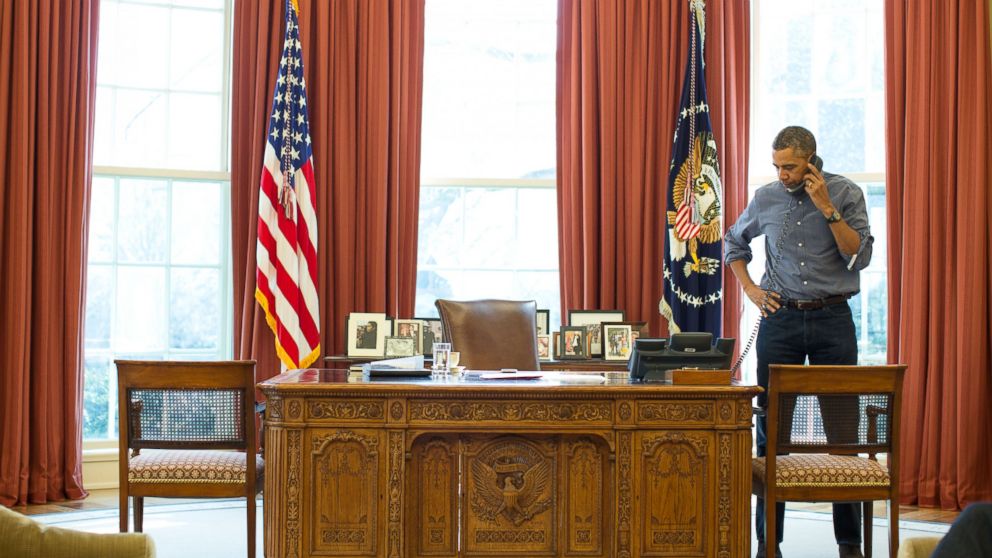When the CIA Keeps the President in the Dark
"Let's say you're recruiting the butler to the prime minister..."

— -- When President Obama spoke to German Chancellor Angela Merkel about Ukraine last week, there could have been an awkward moment prompted by the arrest the day before of a double agent allegedly working secretly for the CIA within German intelligence. At least there likely would have been, had Obama known about the arrest or the undercover spy to begin with.
But the president went into the call blind and Merkel didn’t bring it up, according to White House National Security Council spokesperson Caitlin Hayden. The incident has left “frustrated” White House officials to question why the CIA didn’t immediately tell the administration about the bungled operation, The New York Times reported.
It’s unclear who is responsible for the breakdown in communication about the arrest -- Hayden and the CIA won’t say -- but two retired senior intelligence officials told ABC News it should not be surprising that most likely the president and his national security advisor all along were not aware of the alleged recruitment of the German agent, as well as that of another recently discovered purported U.S. spy in the German Defense Ministry.
As former White House counter-terrorism advisor and ABC News consultant Richard Clarke put it, “never in a million years” would the president be briefed on what Clarke called such “totally mundane” recruitment targets. A third retired senior CIA covert operations specialist disagreed in this case, saying it was a “real possibility” the White House was aware of the operation.
Either way, all three former senior officials said it’s up to the CIA’s “good judgment” whether to let the White House in on what one called “pure espionage.”
How Do You Say Awkward in German? Kerry, German FM to Talk Spying
Ally: Germany's Merkel Not Amused by US Spy Case
Ex-CIA Head: 'Shame on Us for Being Caught' in Germany
There are times when by law the CIA must not only inform but seek the approval from the president for certain operations -- most notably for covert actions. Covert action is defined by U.S. law as “an activity or activities of the United States government to influence political, economic or military conditions abroad, where it is intended that the role of the United States will not be apparent or acknowledged publicly…” As put more simply by former CIA Inspector General L. Britt Snider, covert action is “doing something in another country merely beyond gathering information.”
Some more recently exposed major covert action programs include the CIA’s targeted killing drone program, the joint CIA-military mission to kill/capture Osama bin Laden and the reported Stuxnet cyber-attack on the Iranian nuclear program.
In his book “Good Hunting,” longtime CIA veteran Jack Devine, who once led the CIA’s largest Cold War-era covert action program assisting the mujahedeen in Afghanistan against the Russians, emphasizes that all CIA covert action over the years – including the most controversial – were approved or ordered by the president at the time.
“It is true that the CIA’s biggest mistakes involved covert action,” writes Devine, who spent more than 30 years in the shadows for the Agency. “But it is also true that these mistakes, without exception, also involved operations carried out at the behest of presidents pursuing flawed policies. And for every covert action that failed spectacularly, there have been others that enabled presidents and policy makers to achieve ends in the nation’s interest with an unseen hand, which is almost always preferable to a heavy footprint.”
Retired veteran CIA attorney John Rizzo told ABC News, “Covert actions are the ones that have tended to become messy over the years, going back to the days of the wink and nod from the president” and now come with a whole “legal regime” to ensure that all bureaucratic checks are in place, including briefings for the correct members of Congress.
But none of those rules apply to the CIA’s regular intelligence collection, or “pure espionage,” according to Rizzo.
“Unlike covert action, the president does not have to approve intelligence collection operations. That's what CIA does, recruit foreign agents when they can,” said Rizzo, author of "Company Man". “There’d be no reason for [Obama] to have known, for instance, if the CIA has in fact recruited German citizens.”




